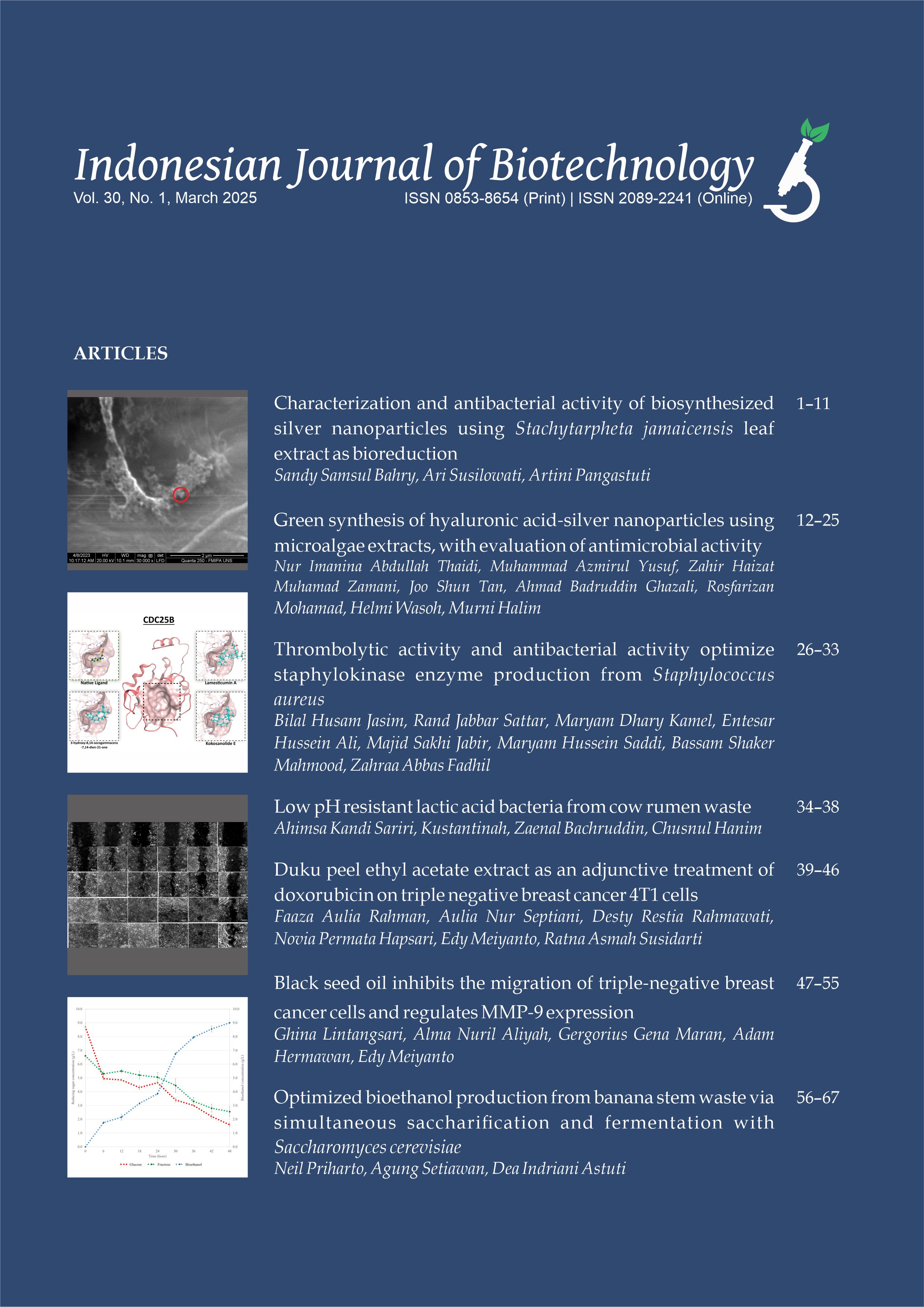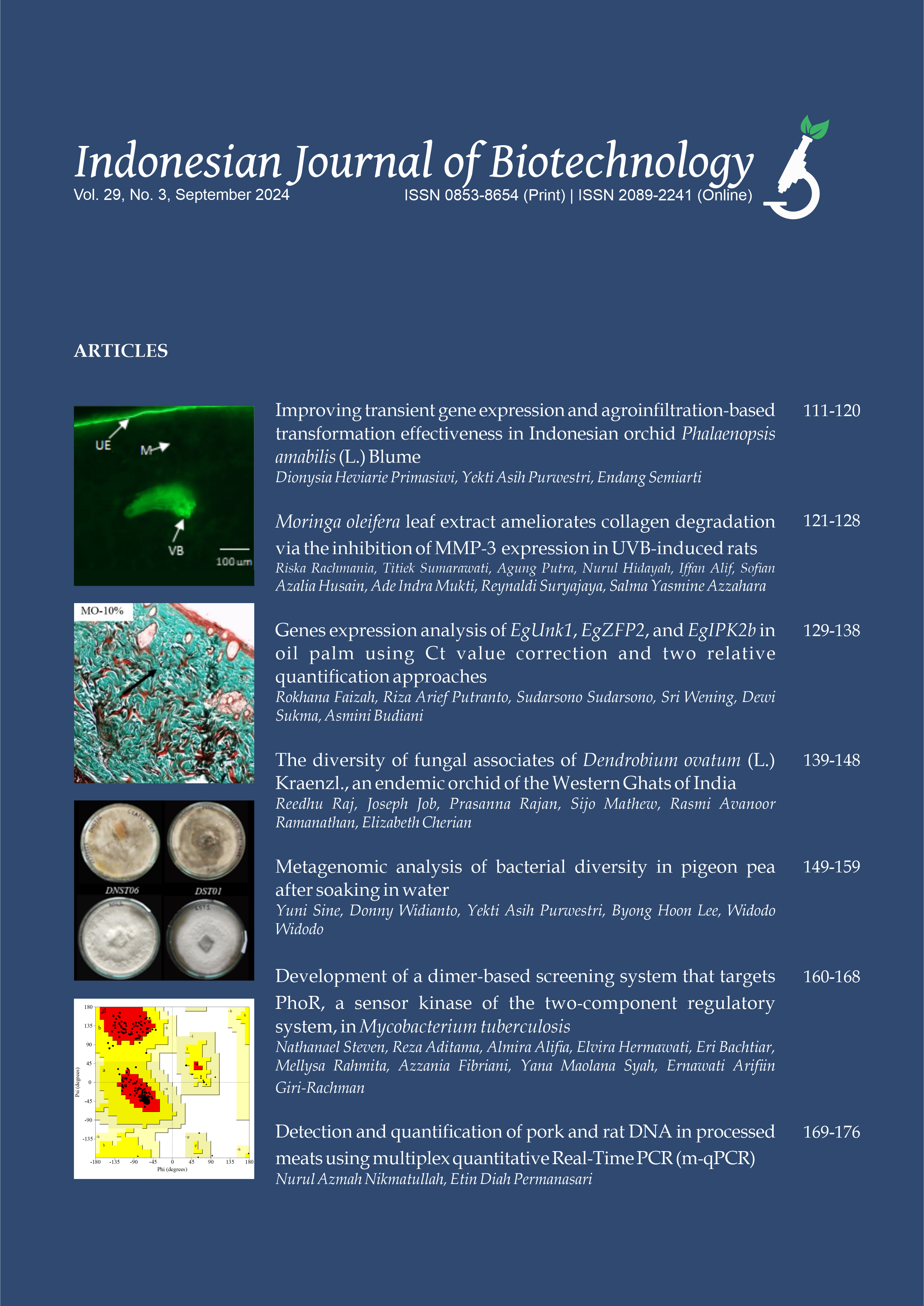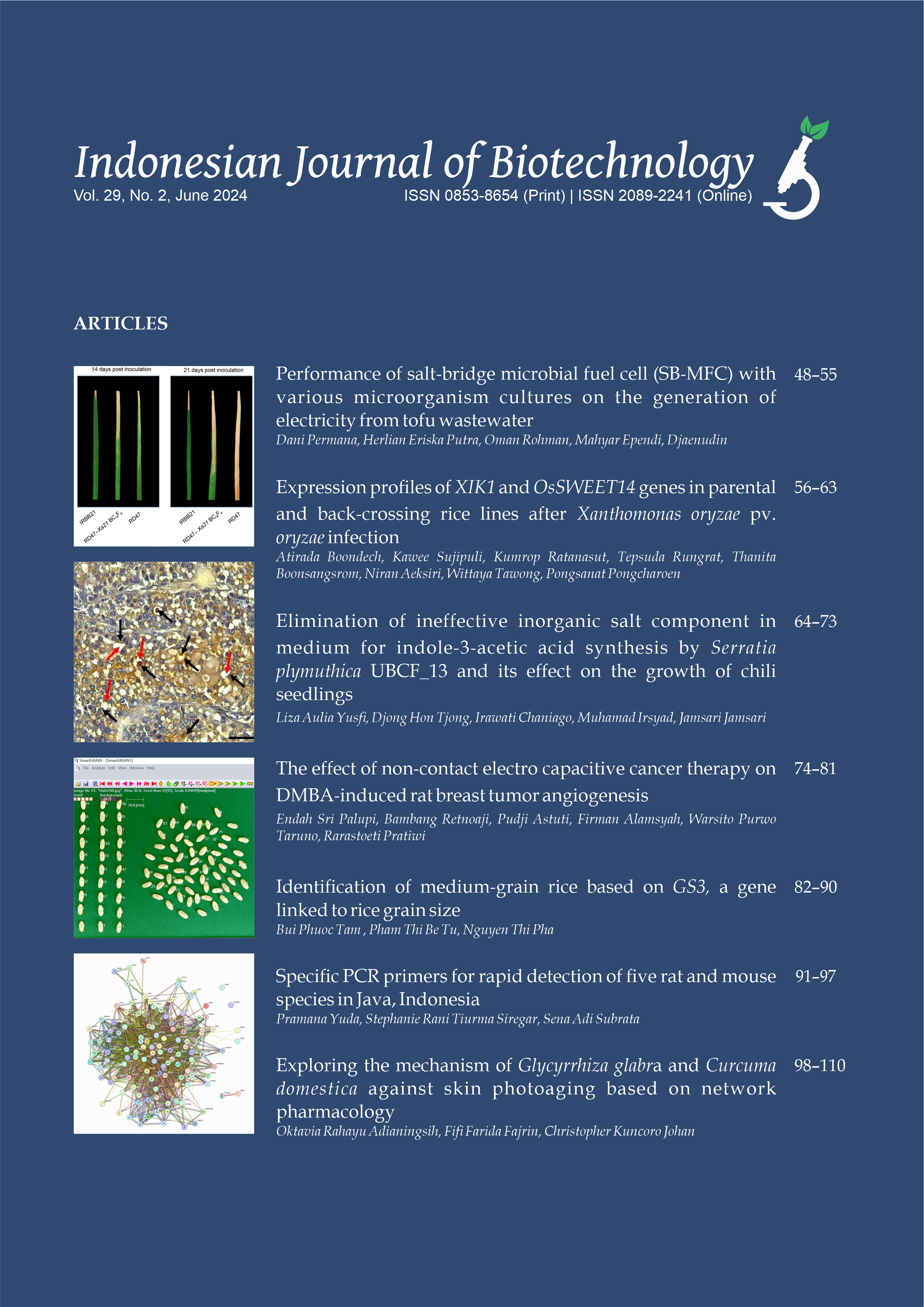Cytotoxic activity and apoptosis induction of avocado Persea americana Mill. seed extract on MCF-7 cancer cell line
Yuli Widiyastuti(1*), Rarastoeti Pratiwi(2), Sugeng Riyanto(3), Subagus Wahyuono(4)
(1) Medicinal Plants and Traditional Medicine Research and Development Centre, Jalan Raya Lawu 11, Tawangmangu, Solo 57792, Indonesia
(2) Faculty of Biology, Universitas Gadjah Mada, Jalan Sekip Utara, Yogyakarta 55281, Indonesia
(3) Faculty of Pharmacy, Universitas Gadjah Mada, Jalan Sekip Utara, Yogyakarta 55281, Indonesia
(4) Faculty of Pharmacy, Universitas Gadjah Mada, Jalan Sekip Utara, Yogyakarta 55281, Indonesia
(*) Corresponding Author
Abstract
Keywords
Full Text:
PDFReferences
Abubakar ANF, Achmadi SS, Suparto IH. 2017. Triterpenoid of avocado (Persea americana) seed and its cytotoxic activity toward breast MCF-7 and liver HepG2 cancer cells. Asian Pac J Trop Biomed 7(5):397–400. doi:10.1016/j.apjtb.2017.01.010.
Dabas D, Shegog RM, Ziegler GR, Lambert JD. 2013. Avocado (Persea americana) seed as a source of bioactive phytochemicals. Curr Pharm Des 19(34):6133– 6140. doi:10.2174/1381612811319340007.
D’Ambrosio SM, Han C, Pan L, Kinghorn AD, Ding H. 2011. Aliphatic acetogenin constituents of avocado fruits inhibit human oral cancer cell proliferation by targeting the EGFR/RAS/RAF/MEK/ERK1/2 pathway. Biochem Biophys Res Commun 409(3):465– 469. doi:10.1016/j.bbrc.2011.05.027.
Ding H, Chin YW, Kinghorn AD, D’Ambrosio SM. 2007. Chemopreventive characteristics of avocado fruit. Semin Cancer Biol 17(5):386–394. doi:10.1016/j.semcancer.2007.04.003.
Ding H, Han C, Guo D, Chin YW, Ding Y, Kinghorn AD, DÁmbrosio SM. 2009. Selective induction of apoptosis of human oral cancer cell lines by avocado extracts via a ROS-mediated mechanism. Nutr Cancer 61(3):348–356. doi:10.1080/01635580802567158.
Dreher ML, Davenport AJ. 2013. Hass avocado composition and potential health effects. Crit Rev Food Sci Nutr 53(7):738–750. doi:10.1080/10408398.2011.556759.
Duarte PF, Chaves MA, Borges CD, Mendonça CRB. 2016. Avocado: characteristics, health benefits and uses. Cienc. Rural 46(4):747–754. doi:10.1590/0103- 8478cr20141516.
Elmore E, Siddiqui S, Desai N, Moyer MP, Steele VE, Redpath JL. 2002. The human epithelial cell cytotoxicity assay for determining tissue specific toxicity: method modifications. Methods Cell Sci 24(4):145– 153. doi:10.1023/A:1024453300493.
Harborne J. 1987. Metode Fitokimia: Penuntun Cara Modern Menganalisis Tumbuhan [Methods in phytochemistry: A guide on modern plant analysis]. Bandung: ITB. Translated by Padmawinata, K & Soediro, I. La Vecchia C, Altieri A, Tavani A. 2001. Vegetables, fruit, antioxidants and cancer: a review of Italian studies. Eur J Nutr 40(6):261–267. doi:10.1007/s394-001- 8354-9.
Leite JJG, Brito EHS, Cordeiro RA, Brilhante RSN, Sidrim JJC, Bertini LM, Morais SMd, Rocha MFG. 2009. Chemical composition, toxicity and larvicidal and antifungal activities of Persea americana (avocado) seed extracts. Rev Soc Bras Med Trop 42(2):110–113. doi:10.1590/s0037- 86822009000200003.
Matsusaka Y, Kawabata J, Kasai T. 2003. Antioxidative constituents in avocado persea americana Mill.) seeds. Nippon Shokuhin Kagaku Kogaku Kaishi 50:550– 552. doi:10.3136/nskkk.50.550.
Morton J, Dowling C. 1987. Fruits of warm climates. Michigan University: JF Morton. Nagaraj M, Sandhya V, Supriya G, Manju R, Kumari P, Bole S, Lalitha V, Kiran B. 2010. Antioxidant and antibacterial activity of avocado (Persea gratissima Gaertner.) seed extract. World Appl Sci J 9(6):695– 698.
Paul R, Kulkarni P, Ganesh N. 2011. Avocado fruit (Persea americana Mill) exhibits chemo-protective potentiality against cyclophosphamide induced genotoxicity in human lymphocyte culture. J Exp Ther Oncol 9(3):221–230.
Ramos-Jerz MDR, Villanueva S, Jerz G, Winterhalter P, Deters AM. 2013. Persea americana Mill. seed: fractionation, characterization, and effects on human keratinocytes and fibroblasts. Evid Based Complement Alternat Med 2013:1–12. doi:10.1155/2013/391247. Article ID 391247.
Rodríguez-Carpena J, Morcuende D, Estévez M. 2011. Avocado by-products as inhibitors of color deterioration and lipid and protein oxidation in raw porcine patties subjected to chilled storage. Meat Sci 89(2):166–173. doi:10.1016/j.meatsci.2011.04.013.
Takenaga F, Matsuyama K, Abe S, Torii Y, Itoh S. 2008. Lipid and fatty acid composition of mesocarp and seed of avocado fruits harvested at northern range in Japan. J Oleo Sci 57(11):591–597. doi:10.5650/jos.57.591.
Taraphdar AK, Roy M, Bhattacharya RK. 2001. Natural products as inducers of apoptosis: Implication for cancer therapy and prevention. Curr Sci 80(11):11. USAID. 2014. The U.S. market for Avocado. Technical Report Market Survei #19. USAID; [cited 2017 January 28]. [place unknown]. Available from: http://pdf.usaid.gov/pdf_docs/PA00KP28.pdf.
Wahyuningsih MSH, Wijayanti MA, Budiyanto A, Hanafi M. 2015. Isolation and identification of potential cytotoxic compound from kembang bulan (Tithonia diversifolia (Hemsley) A Gray) leaves. Int J Pharm Pharm Sci 7(6):298–301.
Wang W, Bostic TR, Gu L. 2010. Antioxidant capacities, procyanidins and pigments in avocados of different strains and cultivars. Food Chem 122(4):1193–1198. doi:10.1016/j.foodchem.2010.03.114.
Widiyastuti Y, Pratiwi R, Riyanto S, Wahyuono S. 2014. Chloroform and methanolic extract of avocado seed (Persea americana Mill.) against MCF-7 cancer cell line. In: W Jokopriyambodo, Y Widyastuti, S Wahyono, R Mujahid, D Subositi, editors. Proceedings of the International Symposium on Medical Plants and Traditional Medicine. volume XLVI. Lembaga Penerbit Badan Penelitian dan Pengembangan Kesehatan. p. 598–607.
Wong RSY. 2011. Apoptosis in cancer: from pathogenesis to treatment. J Exp Clin Cancer Res 30:87. doi:10.1186/1756-9966-30-87.
Article Metrics
Refbacks
- There are currently no refbacks.
Copyright (c) 2018 The Author(s)

This work is licensed under a Creative Commons Attribution-ShareAlike 4.0 International License.









